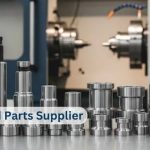Precision Engineering Services: BA Automotive, Innovative and Quality Driving
It has been voluntary to be pinpoint accurate in manufacturing; it is not anymore. In a competitive world today, it is crucial to have pinpoint accuracy. Even the innovation placed on modern technology needs these precision engineering services- particularly in such countries as Germany, where engineering and precision manufacturing are the real world benchmarks. Such services have the expertise to manufacture parts that have very strict tolerances.
In either case, whether the automotive industry needs a complex part or the construction industry needs a solid one, the manufacturing industry has always been in need of highly precise machining and advanced manufacturing.
At BA Automotive, we provide these solutions. We merge German-inspired quality, state-of-the-art technology, and more than five decades of experience in order to make you reach the market quicker and achieve unrivaled quality.
What are the precision engineering services?
Precision engineering is a niche that works on machining the components with very high accuracy and tolerance within a zone of a micron. It unites high technology equipment and masterful skills that satisfy the most stringent requirements.
Key capabilities at BA Automotive include:
- CNC/VMC precision machining: Computer-controlled milling, turning, and grinding allow manufacturers to create repeatable, accurate parts of steel, aluminum, brass, and copper.
- Exacting tooling and die manufacturing: We build the necessary molds, jigs, and fixtures needed to produce high volumes of product, and those molds must be perfect to produce repeatable results.
- Sheet metal stamping: With our experience in sheet metal stamping, we can stamp metal into various required shapes within a short period of time, which is critical in automotive and construction part components.
- Measuring and quality control: Measurement science is essential. Technicians check the design of every component with a 3D measuring system or automated inspection means.
Industries That Rely on Precision Engineering
The requirement of reliable, correct parts stretches to a wide range of industries. Our solutions offer solutions to lifesaving applications across:
- Automotive: Engine parts, custom stamping tooling, brackets, and gaskets requiring exposure to extreme temperatures are some of the parts that we design and produce.
- Construction: Contractors utilize our machined components and sturdy sheet metal.
- Oil & Gas: We supply high technology products at competitive prices, which comply with the industry’s rigorous demands.
Advantages of Precision Engineering Services Use
The decision to contact BA Automotive is not merely to manufacture parts but has other enormous benefits.
- Improved product quality: The aim of improvement in accuracy in engineering contributes to better and more reliable products with longer shelf-life.
- Reduced rejection rates: The quality inspection that we employ is very rigid, which improves the efficiency of the manufacturing process by limiting rejection of products as well as minimizing waste of the material used.
- Accelerated creation to manufacturing: Precise machining capabilities with CAD/CAM-designed tooling can result in improved speed of prototyping and an easy transition into large-scale manufacturing.
- Repeatability in mass manufacturing: It is repeatable and precise once the engineers have designed the tool or die, making duplicate parts during the run.
Major Types of Technologies in Precision Engineering
Precision engineering today is characterized by employing state-of-the-art technology. Our superior abilities in BA Automotive:
- CAD/CAM software: CAD/CAM software is used to relate designs on screen to the physical product, and by using software, our expertly trained engineers design parts and produce accurate toolpaths to feed the machines with smooth working transitions throughout the entire production process.
- Wire EDM (Electrical Discharge Machining): This method is non-contact and separates the material by using electrical sparks to form intricate shapes out of hard material unbelievably accurately.
- Laser cutting and welding: Laser cutting and laser welding can be done with a system of high-energy lasers offering clean and exacting cuts and welds, and processing of intricate frames and fragmentary materials.
- Digital metrology: Inspection by use of 3D Scanners, and CMMs (Coordinate Measuring Machineries) to inspect and ascertain that parts are within international tolerances, ISO requirements.
The selection of a proper precision engineering company
Choosing a proper partner is a life and death business judgment. Our commitment to continuous improvement and quality is evident since we have an ISO 9001:2015 certification at BA Automotive.
List of Selection Criteria:
- Experience & Certifications: Do they have proven credentials and quality accreditations, like being an ISO approved manufacturer, like BA Automotive?
- In-house Capabilities: Do they have end-to-end capabilities such as in-house designing, tool and die making, and all types of machining technologies?
- Material knowledge: Do they have experience with an extensive number of materials, both common metals and more specialised alloys?
- Support: Do they have special technical support in the event of a prototyping run or mass production run?
Frequently Asked Questions
Q1. Precision machining vs. standard machining?
Ans. Standard machining: The standard machining uses a general set of tolerances and applies to many applications. Precision machining, however, is a niche market having to deal with considerably tighter (mm or less) tolerances and specific shapes, and has to be specialized so that high accuracy and reliability are demanded by the parts produced.
Q2. What accuracy can be realized in CNC?
Ans. It has become possible with modern CNC machines to attain accuracy to the extent of a few microns (0.001mm), about a fraction of a human hair. Such accuracy is needed with mission-critical parts in such industries as aerospace and medicine.
Q3. What materials can be applied in precision engineering?
Ans. Precision engineering may be used on nearly all materials, such as many grades of steel, aluminum, titanium, copper, and special alloys. Depending upon the requirements of a particular application in relation to strength, weight, corrosion resistance, and thermal properties, the material used tends to be selected.
Q4. How does precision engineering aid prototyping?
Ans. Precision engineering plays an imperative role in prototyping since it enables one to develop precise, workable prototypes, which are similar to the exact design of the end product. This allows engineers to test and verify a design within a short time, effectively avoiding the chances of mistakes being made after considerable costs have been incurred in mass production.
Q5. Which industries deal with stamping tools?
Ans. Stamping apparatus and dies are essential to industries where many pieces of the same part are manufactured, such as the automotive, electronics, and appliance mold. They are applied in the rapid creation of sheet metal into complex designs such as brackets, enclosures, and casings.
Conclusion
Precision engineering services have since grown to be an important ingredient in the modern-day manufacturing sector and have facilitated the degree of quality and definition that has given companies a competitive advantage. Precision solutions are also developing the international benchmark in countries such as Germany, which is a giant in matters of engineering and manufacturing. With the power of the latest technology and an in-depth knowledge of custom solutions and sheet metal fabrication, the most intricate designs can become high-quality, reliable products.
Wanting to find a good manufacturer? German-inspired standards of engineering, industry know how and time-tested quality performance guides us at BA Automotive to provide the solutions you need in your exact up-to-date specification. Visit us now to know more or to quote your next project!

 Previous Post
Previous Post Next Post
Next Post